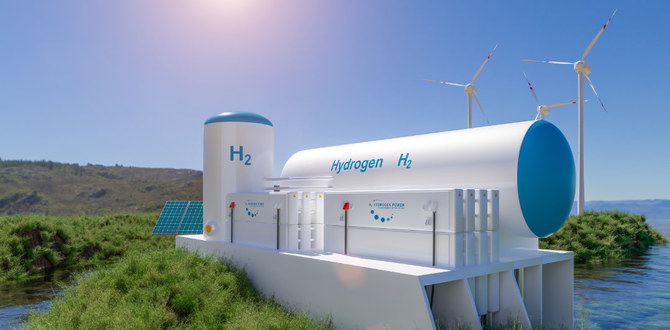The hydrogen wave in the Gulf could paint the world green

https://arab.news/vg8s5
“Amid every crisis lies great opportunity,” said Albert Einstein. By observing the developments of the energy transition and global climate actions, it is hard to disagree with the genius. Such problems can only be tackled by collective efforts, which might bring opportunities to all.
More than 70 countries have declared net-zero targets since nearly 200 parties adopted the Paris Agreement. But to achieve these long-term strategies and commitments, close cooperation on multiple levels must happen to have a just and inclusive global energy transition.
Amid the ongoing war in Ukraine and the current energy crisis, the European Commission published its REPowerEU Plan to rapidly phase out the bloc’s dependence on Russian fossil fuels. The plan entails actions to save energy, diversify energy imports, accelerate the energy transition and promote smart investment.
The complementing EU External Energy Strategy will also prepare the bloc for renewable hydrogen trade by increasing capacity and importing up to 10 million tons of hydrogen from reliable partners. Furthermore, the strategy will create win-win situations by setting dedicated partnerships worldwide.
In parallel to the two announcements, the EU released its joint communication on a strategic partnership with the Gulf region by indicating that the EU and the Gulf Cooperation Council represent 20 percent of the global economy and 17.5 percent of international trade.
The strong trade and investment relationship between the two blocs is of mutual interest. The EU will also step up cooperation with the Gulf countries on climate action and clean energy transition and eyes the region as a supplier of decarbonized energy and electricity.
Hydrogen stands now as the best option to ensure sustainable, secure and affordable energy for all, and it is being considered the fuel of the future by many countries that aim to decarbonize their industries while maintaining economic growth. Respectively, hydrogen strategies are being composed and announced all over the world.
With UN climate summits COP27 and COP28 taking place within the Middle East and North Africa region, many investment opportunities are emerging.
Sometimes it feels like no day passes in the region without a new sustainable energy project being announced on every corner. The political will has encouraged the renewable energy business and investment sectors to thrive by establishing joint ventures and projects all over the region.
The Middle East and North Africa are also gradually becoming interlinked with more grid interconnection agreements announced to create a Pan-Arab market and promote regional cooperation.
Europe’s neighbors to the south are increasingly becoming potential partners when it comes to hydrogen. With massive abundant renewable energy resources needed for producing green hydrogen, geographical proximity and strong political will would be crucial factors.
The GCC region indeed could become Europe’s reliable hydrogen partners in the era of net-zero.
Saudi Arabia, UAE and Oman have all the potential to become trailblazers in exporting clean hydrogen. With the existing infrastructure and decades-long experience in maintaining leadership in the oil industry, it could be easy for them to adapt and jump-start the green economy in the region.
The Kingdom has developed green solutions to mitigate climate change by introducing the Saudi Green Initiative and the Middle East Green Initiative, with over 60 sub-initiatives under their umbrella.
During its G20 presidency in 2020, the Kingdom introduced the circular carbon economy approach with its four Rs – to reduce, reuse, recycle and remove, which was endorsed as a holistic and integrated approach to managing emissions to provide new pathways toward economic growth.
The Saudi megacity project of NEOM will host a $5 billion world-scale green hydrogen-based ammonia production facility that will go operational by 2025. And earlier this year, ENOWA, the energy, water and hydrogen subsidiary of NEOM, established the region’s first Hydrogen and Innovation Development Center. The city, which will be powered by renewable energy, is on its way to becoming a global hub of innovation and clean energy.
Saudi Aramco is also taking concrete steps to reach operational net-zero emissions by 2050. The company recently published its sustainability report with pledges to reduce its upstream carbon intensity by at least 15 percent carbon dioxide by 2035 and leverage technology to produce low-carbon hydrogen.
Subsequently, Aramco inaugurated the Aramco Research Center at King Abdullah University of Science and Technology to accelerate the development of low-carbon solutions for the energy industry using advanced analytics.
The Saudi Public Investment Fund is a founding member of the One Planet Sovereign Wealth Fund, which aims to enable sovereign wealth funds to consider climate change in their decision-making and support ambitious programs to mitigate climate change.
PIF has also introduced the region’s first voluntary carbon market, in which five leading Saudi companies signed memorandums of understanding to become its first potential partners.
The Kingdom has recently set its national priorities for research, development and innovation by dedicating 2.5 percent of its gross domestic product for research, development and innovation by 2040.
Energy and industrial leadership are the priorities announced as the Kingdom will seek to innovate technologies for alternative energy production, including green hydrogen, solar and wind.
All these initiatives and projects showcase Saudi keenness to tackle climate change and become a front-runner in the green economy transition.
On the other hand, Germany is a global leader in eco-innovation and the pursuit of climate neutrality. In 2020, Germany released its National Hydrogen Strategy, which includes seven fields of action and 38 measures on both national and European levels, as well as promoting international hydrogen markets and economic partnerships.
By 2030, Germany will invest 7 billion euros ($7.2 billion) in speeding up the market roll-out of hydrogen technology locally and another 2 billion euros to foster international partnerships.
During the German Presidency of the G7 Summit this year, a Climate Club will be set up by the end of 2022. The club is built on three pillars of advancing climate ambitious and transparent climate mitigation policies, accelerating industrial decarbonization and boosting international ambition through partnership and cooperation.
The Climate Club will also serve as an intergovernmental forum for all countries willing to join. Such initiatives show Germany’s eagerness to accelerate the energy transition by going for it through multilateral efforts.
Germany is taking the multilateral cooperation forward by establishing energy partnerships and hydrogen diplomacy offices abroad to enhance the energy dialogue and push ahead with the global energy transition.
In March 2021, the German Federal Ministry for Economic Affairs and Climate Action signed an MoU with the Saudi Ministry of Energy to establish cooperation on hydrogen, which came within the framework of the Saudi-German Energy Dialogue. The collaboration is being supported by the Riyadh-based German-Saudi Arabian Liaison Office for Economic Affairs and Guidehouse.
In addition to that, Germany opened a hydrogen diplomacy office in Riyadh earlier this year to further enhance the cooperation and dialogue on hydrogen. Global hydrogen diplomacy is an initiative by the German Federal Foreign Office to complement the other energy initiatives operating abroad.
Having two initiatives working together in the Kingdom demonstrates Germany’s willingness to cooperate with Saudi Arabia in the era of net-zero, as both countries aim to achieve climate neutrality by 2045 – 2060.
Similar bilateral partnerships and cooperation initiatives are being established and implemented all over the region, which indicates that the two areas will apparently be cooperating closely on hydrogen in the years to come, bringing both regions closer to one another.
• Saqr Alzahrani is a public relations professional with focus on renewables and hydrogen.










































